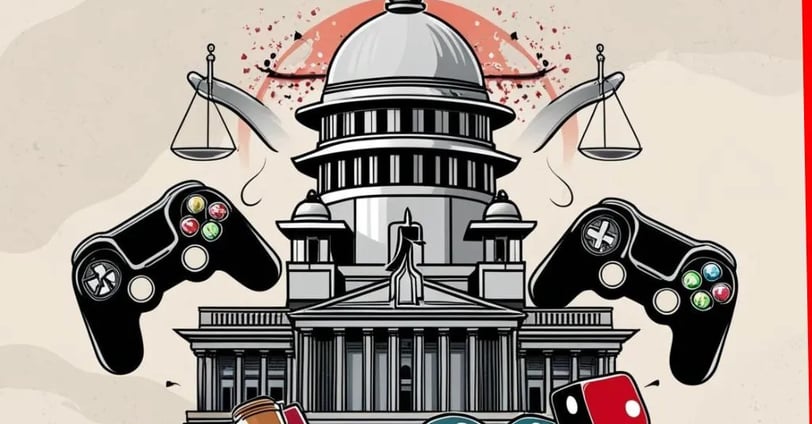Add your promotional text...
Supreme Court's Landmark Stay: A Breather for India’s Online Gaming Sector
Synopsis: In a crucial development for the online gaming industry, the Supreme Court has temporarily stayed GST show-cause notices worth ₹1.12 lakh crore issued to several gaming companies. The ruling has provided much-needed relief to the sector, which has been grappling with high tax demands and policy uncertainties.
VIEWS ON NEWS
By Monika Agarwal
1/10/20253 min read


A Crucial Intervention by the Supreme Court
In a move that has sent ripples across the online gaming industry, the Supreme Court of India on Friday temporarily stayed the Goods and Services Tax (GST) show-cause notices issued by the Directorate General of GST Intelligence (DGGI). These notices had placed an enormous tax liability of ₹1.12 lakh crore on online gaming companies. The stay applies to all related proceedings until the final hearing of the case, scheduled for March 18.
This decision provides a significant reprieve to gaming companies facing potential coercive actions under the notices, while also granting the government additional time to navigate the complexities of taxation in this burgeoning sector.
Industry Impact: A Boost in Confidence
The ruling immediately impacted market sentiment, with shares of major gaming companies like Delta Corp and Nazara Tech experiencing up to a 7% increase during intra-day trading. The stock market reaction underscores the critical role of policy clarity in fostering investor confidence in the online gaming industry.
Anuraag Saxena, CEO of the E-Gaming Federation (EGF), welcomed the ruling, stating:
"This is a win-win, both for gaming operators who were facing coercive action and the government whose timelines may now be extended. We are confident about a fair and progressive resolution to this issue, after which we will see investments, employment, and valuations in the gaming sector grow to its full potential."
The Root of the Issue: Taxation Challenges
The dispute traces back to 2023 when the DGGI issued 71 notices to online gaming companies, alleging GST evasion amounting to ₹1.12 lakh crore. These allegations covered activities in the financial year 2022-23 and the first seven months of FY 2023-24. The notices were issued under Section 74 of the GST Act, which allows authorities to impose penalties of up to 100% of the tax demand.
If enforced, the cumulative liability, including interest and penalties, could exceed a staggering ₹2.3 lakh crore.
Adding to the complexity, in August 2023, the GST Council revised the taxation framework for online gaming. It ruled that all games involving bets—whether based on skill or chance—would attract a 28% GST on the full value of bets placed, as opposed to the gross gaming revenue (GGR). This amendment, effective October 1, 2023, has been criticized for its potential to stifle industry growth.
Implications of the Supreme Court’s Stay
The Supreme Court’s decision to stay the notices has several key implications for the online gaming sector:
Temporary Relief for Gaming Companies
By halting all proceedings related to the ₹1.12 lakh crore demand, the court has provided breathing space for companies to focus on their operations without the looming threat of enforcement actions.Time for Stakeholders to Reassess
The ruling allows policymakers, tax authorities, and industry players to engage in meaningful discussions and explore balanced solutions to the taxation issue.Boost for Industry Confidence
The positive market reaction highlights the importance of judicial intervention in addressing policy uncertainties. A favorable resolution could unlock significant investment and innovation in the gaming sector.Potential Precedent
The case could set a benchmark for how regulatory and tax disputes in emerging industries are resolved, emphasizing the need for progressive and fair policies.
The Road Ahead: March 18 and Beyond
As the case moves toward its final hearing on March 18, the industry remains optimistic about a resolution that balances government revenue objectives with the sector’s growth potential. Stakeholders argue that the current taxation framework, especially the 28% GST on the full value of bets, disproportionately burdens gaming operators and discourages investment.
The online gaming industry, a significant contributor to India’s digital economy, holds immense potential for job creation, foreign investment, and innovation. A fair and growth-oriented tax policy could unlock this potential, driving the sector to new heights.
Balancing Regulation with Growth
The Supreme Court’s intervention underscores the importance of striking a balance between regulatory oversight and industry development. While tax compliance is essential, excessive burdens can stifle innovation and drive businesses out of the formal economy.
The online gaming sector stands at a crossroads, and the decisions made in the coming months will shape its trajectory for years to come. With the Supreme Court’s stay providing a temporary shield, the focus now shifts to crafting policies that foster long-term growth while ensuring fair taxation.
A Sector Poised for Transformation
The temporary relief granted by the Supreme Court marks a pivotal moment for India’s online gaming industry. It signals an opportunity for policymakers, industry leaders, and the judiciary to collaboratively address the challenges facing this rapidly growing sector.
With the right approach, the online gaming industry could emerge as a powerhouse of India’s digital economy, creating jobs, attracting investments, and contributing significantly to the nation’s GDP. The March 18 hearing will be a defining moment, and all eyes will be on the Supreme Court as it charts the course for this dynamic and promising sector.
